Mitigating Risk Factors for Local School TCKs
Tanya crossman and Lauren mccall
When TCK Training released our white paper, Caution and Hope: The Prevalence of Adverse Childhood Experiences in Globally Mobile Third Culture Kids, we were only beginning to scratch the surface of the data we collected from 1,904 individuals who completed our 2021 survey on childhood trauma in globally mobile Third Culture Kids. In our second white paper, TCKs at Risk: Risk Factors and Risk Mitigation for Globally Mobile Families, we looked at 12 risk factors and ways to mitigate these risks. This article is part of a series of blog posts that looks a little deeper at certain sub-groups represented in the data.
Mitigating Risk Factors for Local School TCKs
In the course of our research into Adverse Childhood Experiences among globally mobile young people, we learned a lot of difficult truths about what local/national school students experienced. This blog post will discuss the prevalence of various types of abuse and neglect without graphic descriptions.
According to our research, TCKs who were primarily educated in local schools were over four times more likely than Americans to experience emotional abuse at home. Our survey also found that nearly 1 in 3 local school TCKs (29%) experienced sexual abuse, and nearly half of those born after 1980 (47%) reported household adult mental illness.
According to our research, TCKs who were primarily educated in local schools were over four times more likely than Americans to experience emotional abuse at home. Our survey also found that nearly 1 in 3 local school TCKs (29%) experienced sexual abuse, and nearly half of those born after 1980 (47%) reported household adult mental illness.
Internationally mobile families and children are often viewed as privileged, and therefore not at risk of ACEs, PTSD, or other mental health struggles. This data suggests the opposite.
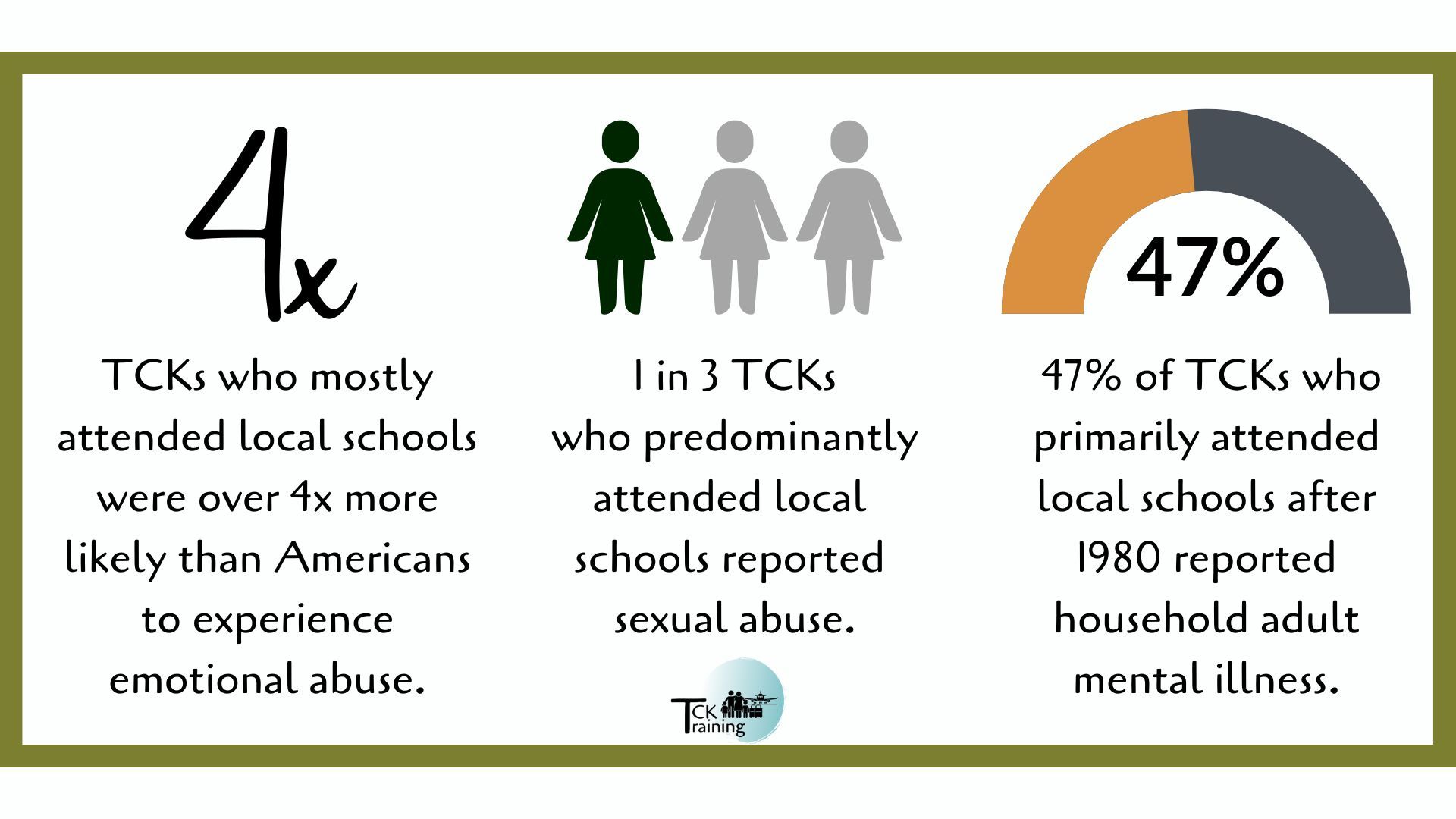
Among the demographic factors we collected were the primary reason the family moved internationally, and their core educational experience. The education types were: local/national school, international school, Christian international school, boarding school, and homeschool.
Of those who identified local school as their core educational experience, one third were military kids, one third missionary kids, and most of the remaining third from international business families.
We are using two types of charts in this blog post. We compare risk factors in different educational experiences, but also compare the rates seen in local school students to TCKs overall and Americans.
Adverse Childhood Experiences (ACEs)
Research into ACEs has taken place worldwide across 25 years. The ten ACE factors are divided into Child Maltreatment (abuse and neglect directly suffered as a child) and Household Dysfunction (factors affecting the childhood living environment). The ACE questionnaire asks about childhood experiences without using the words "abuse" or "neglect" - helpful for catching abusive or neglectful experiences a person would not label that way themselves. We often compare our results to the CDC-Kaiser study of 17,000 Americans, as this is the largest ACE study done worldwide to date. Comparisons with other global populations can be found in our white paper.
We saw consistently different results across categories among TCKs born before/after 1980 – with the Boomer/Gen X generations on one side, and the Millennial/Gen Z generations on the other. This also delineates the groups who were/were not impacted by the internet during childhood.
Abuse
Abuse is broken down into three categories: physical, emotional and sexual. (The ACE questionnaire only asks about physical and emotional abuse that occurs within the home.) 1 in 4 (26%) locally educated TCKs were physically abused at home, while nearly 1 in 3 (29%) experienced sexual abuse, and nearly half (48%) were emotionally abused at home.
Adverse Childhood Experiences (ACEs)
Research into ACEs has taken place worldwide across 25 years. The ten ACE factors are divided into Child Maltreatment (abuse and neglect directly suffered as a child) and Household Dysfunction (factors affecting the childhood living environment). The ACE questionnaire asks about childhood experiences without using the words "abuse" or "neglect" - helpful for catching abusive or neglectful experiences a person would not label that way themselves. We often compare our results to the CDC-Kaiser study of 17,000 Americans, as this is the largest ACE study done worldwide to date. Comparisons with other global populations can be found in our white paper.
We saw consistently different results across categories among TCKs born before/after 1980 – with the Boomer/Gen X generations on one side, and the Millennial/Gen Z generations on the other. This also delineates the groups who were/were not impacted by the internet during childhood.
Abuse
Abuse is broken down into three categories: physical, emotional and sexual. (The ACE questionnaire only asks about physical and emotional abuse that occurs within the home.) 1 in 4 (26%) locally educated TCKs were physically abused at home, while nearly 1 in 3 (29%) experienced sexual abuse, and nearly half (48%) were emotionally abused at home.
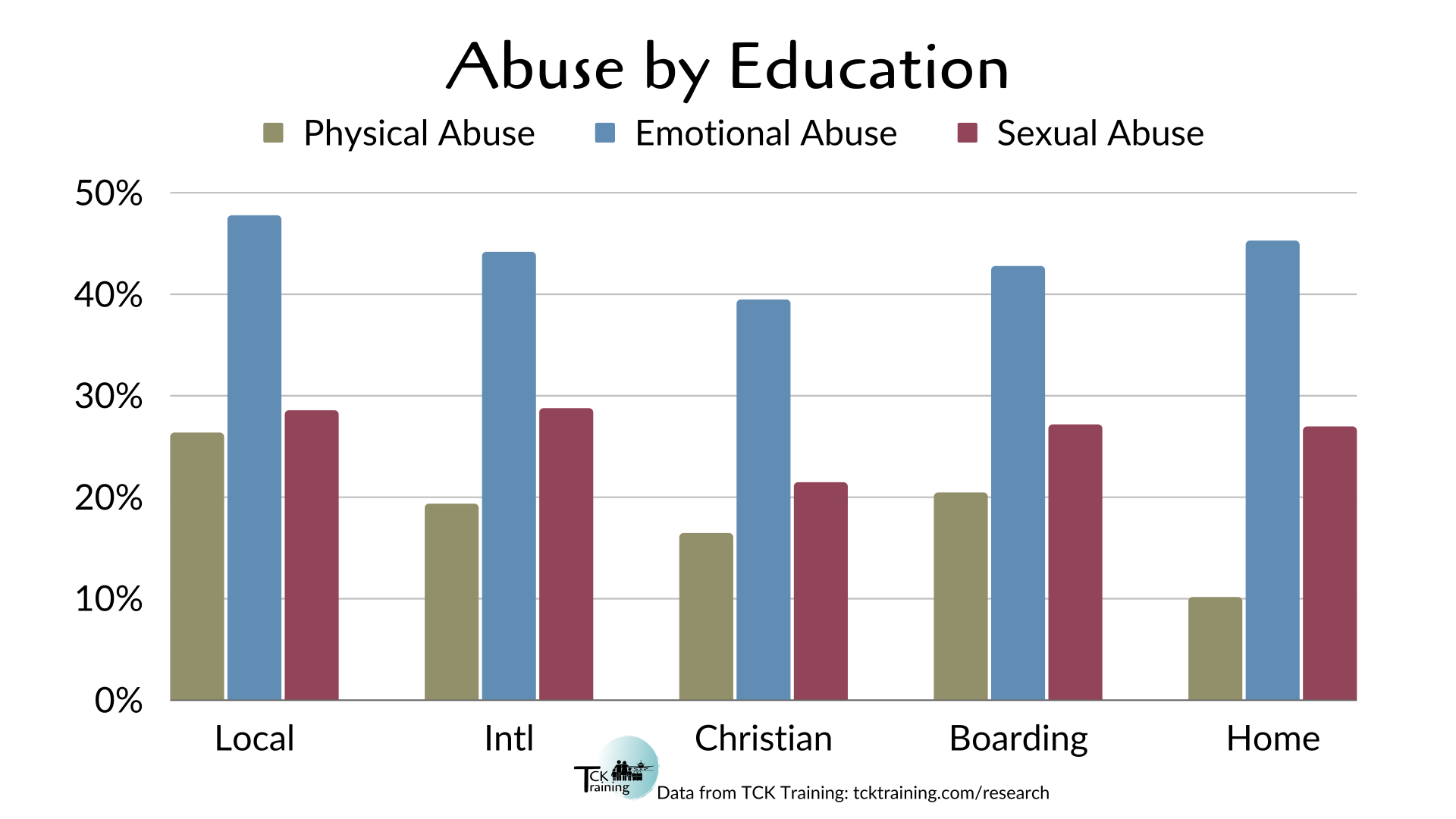
Local school TCKs experienced physical abuse at a higher rate than TCKs over all (26% vs. 19%), and emotional and sexual abuse at slightly higher rates than TCKs overall - emotional abuse (48% vs 44%) and sexual abuse (29% vs. 27%). Local school TCKs experienced emotional abuse at nearly 5 times the rate of Americans (48% vs. 11%).
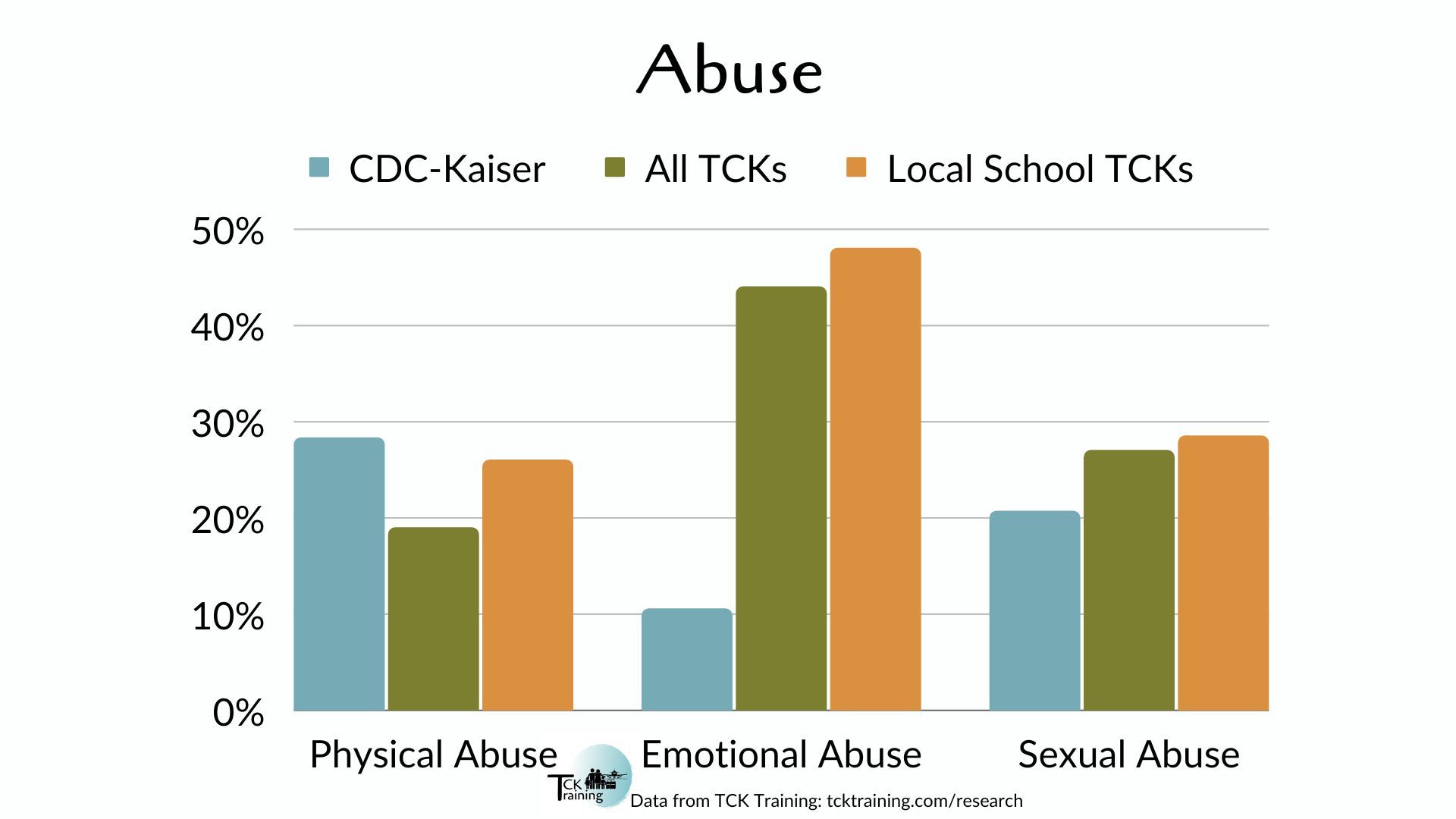
Over time, physical abuse in local school TCKs increased from 6% to 13%, doubling the rate for those born after 1980. Emotional abuse stayed the same over time and sexual abuse decreased from 36% to 21%, reducing the rate by half among those born after 1980. While the decreased trend in sexual abuse is encouraging, it still leaves 1 in 5 local school TCKs born after 1980 experiencing sexual abuse before the age of 18.
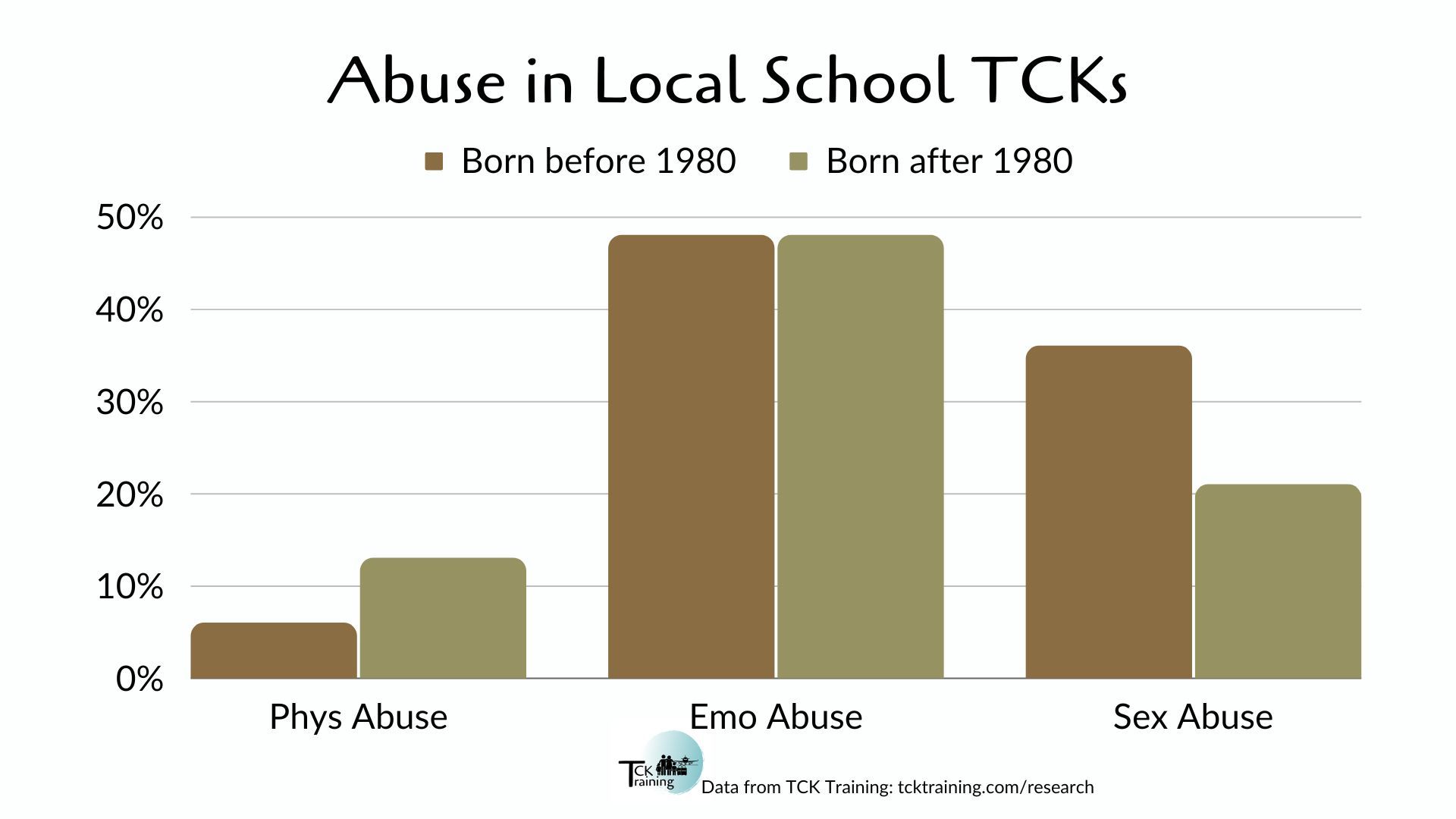
While child-to-child sexual abuse was not included in the original ACE study, it is worth noting due to the lasting effects on survivors. 29% of local school TCKs reported experiencing child-to-child sexual abuse, a rate second only to boarding school TCKs. Child-to-child sexual abuse is a sign that further support may be needed; TCKs who reported child-to-child sexual abuse also had higher rates of emotional abuse (65%), sexual abuse (44%), and emotional neglect (54%).
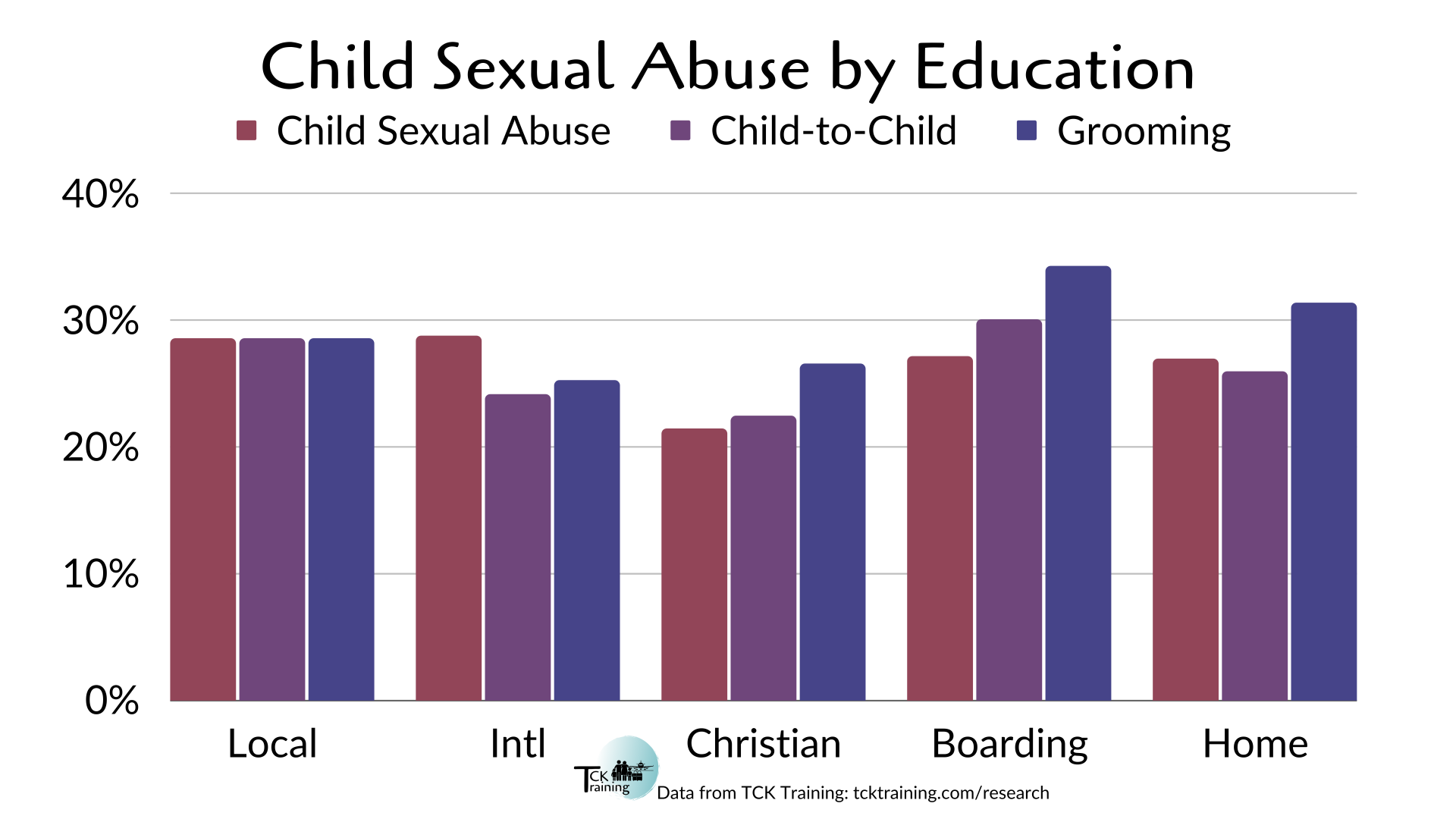
Another risk factor not included in the ACE questionnaire is grooming. 68% of TCKs who reported grooming also reported experiencing child sexual abuse. 29% of local school students reported grooming behaviors directed toward them by adults. This statistic should be a call to action for those caring for TCKs attending local schools.
Neglect
Neglect is defined through the lens of perception, where a child feels/worries their emotional/physical needs will not be met. While physical neglect is often seen as an extension of poverty, in the ACE context it is not just about what the child has access to but also about their security that provision will continue in the future. In the case of emotional neglect, a child feels unloved or unimportant – whether or not their parents actually do love them. In cases of physical neglect, a child feels their physical needs may not be met – even if they are always fed and cared for. This can look like worry that they will not have enough food, shelter, clean clothing, protection, or medical care.
Neglect
Neglect is defined through the lens of perception, where a child feels/worries their emotional/physical needs will not be met. While physical neglect is often seen as an extension of poverty, in the ACE context it is not just about what the child has access to but also about their security that provision will continue in the future. In the case of emotional neglect, a child feels unloved or unimportant – whether or not their parents actually do love them. In cases of physical neglect, a child feels their physical needs may not be met – even if they are always fed and cared for. This can look like worry that they will not have enough food, shelter, clean clothing, protection, or medical care.
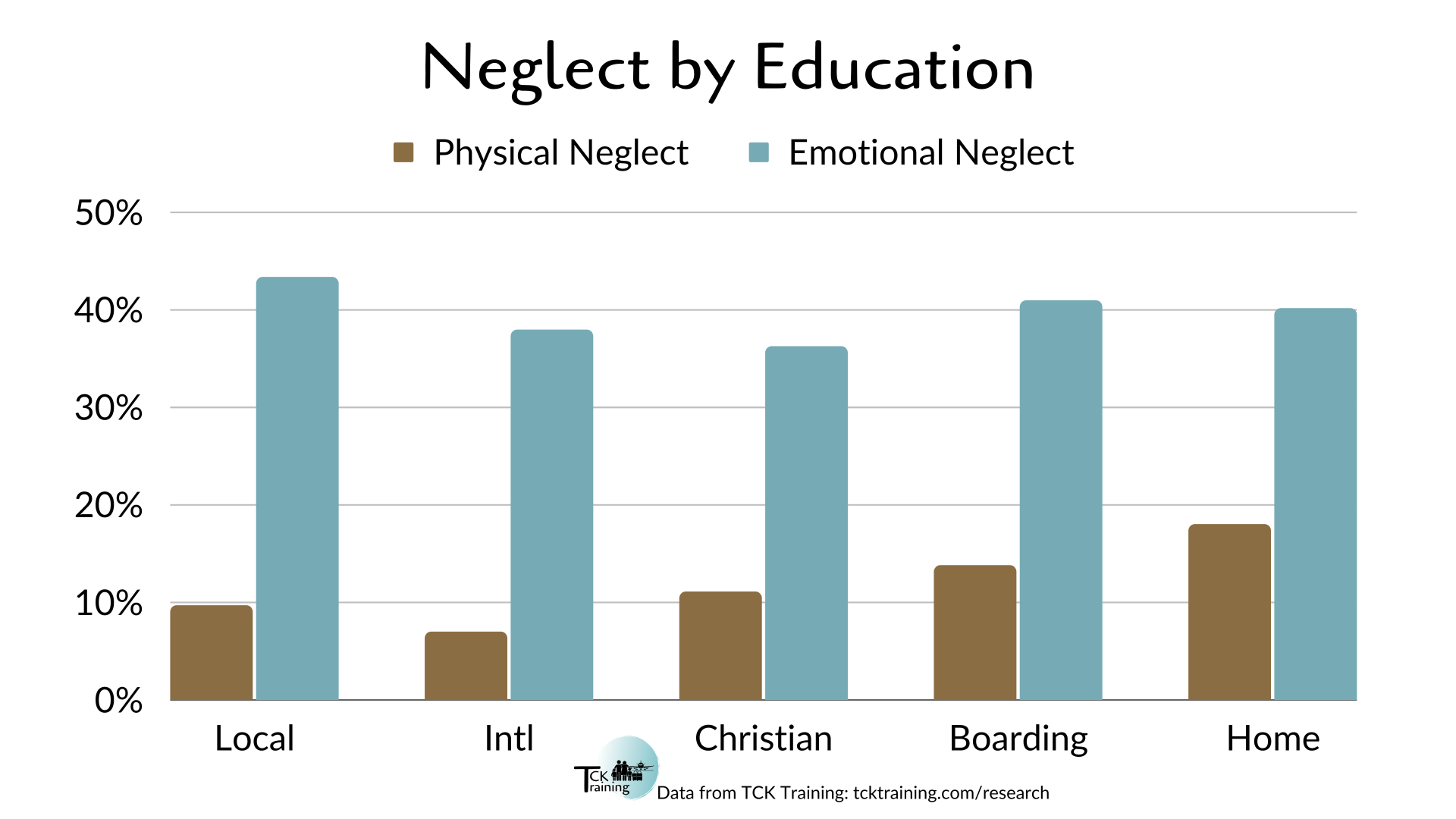
10% of TCKs who primarily attended local schools reported physical neglect, the same rate reported by Americans and slightly lower than TCKs overall (11%). 2 in 5 local school TCKs (43%) reported emotional neglect, four times the rate found among Americans, and slightly higher than seen in TCKs overall (40%).
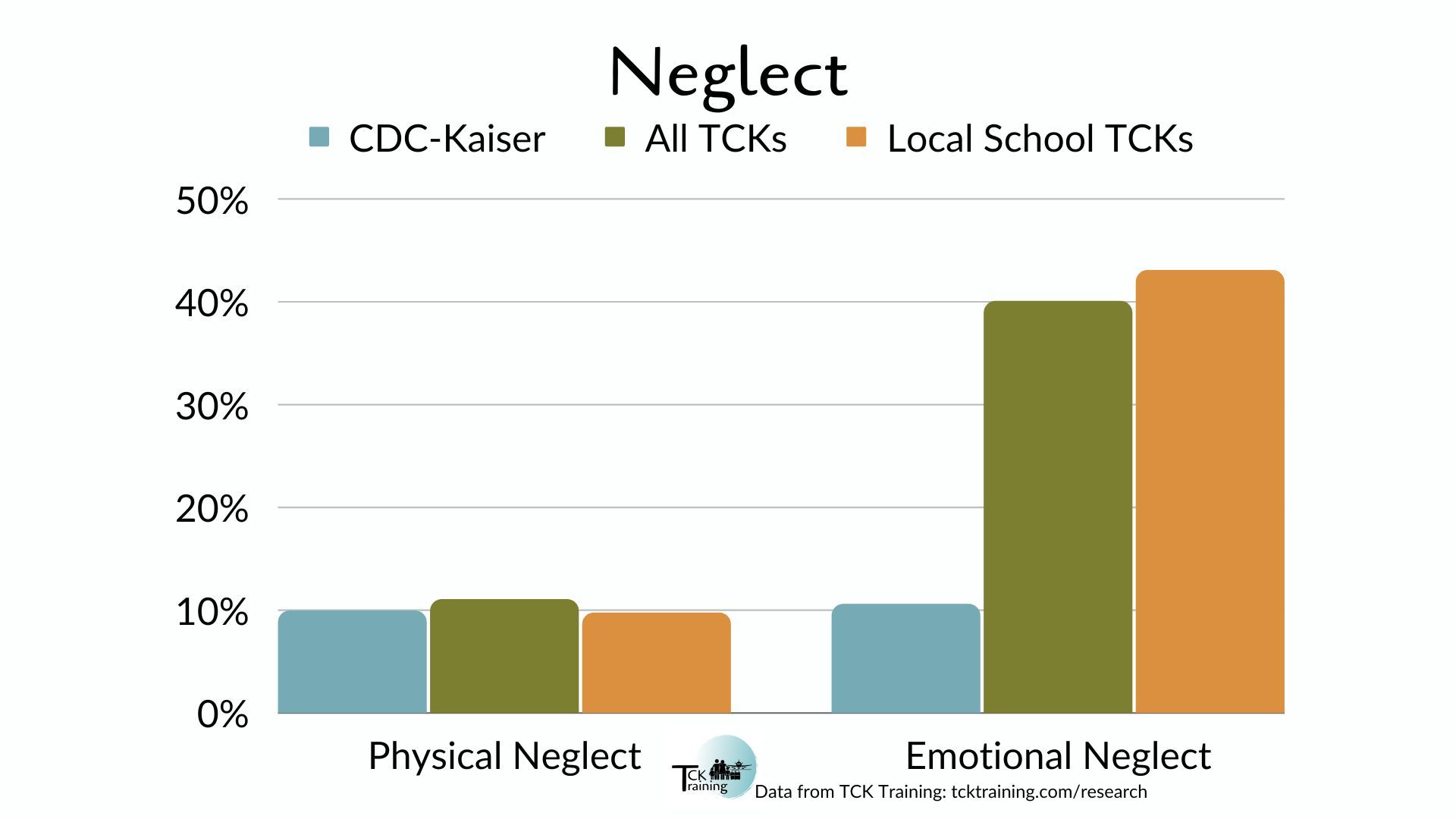
Both physical and emotional neglect increased over time among local school TCKs. The rate of physical neglect more than doubled from 6% of Boomer/Gen X to 13% of Millennial/Gen Z local school TCKs. 37% of older local school TCKs compared to 49% of those born after 1980 reported emotional neglect.
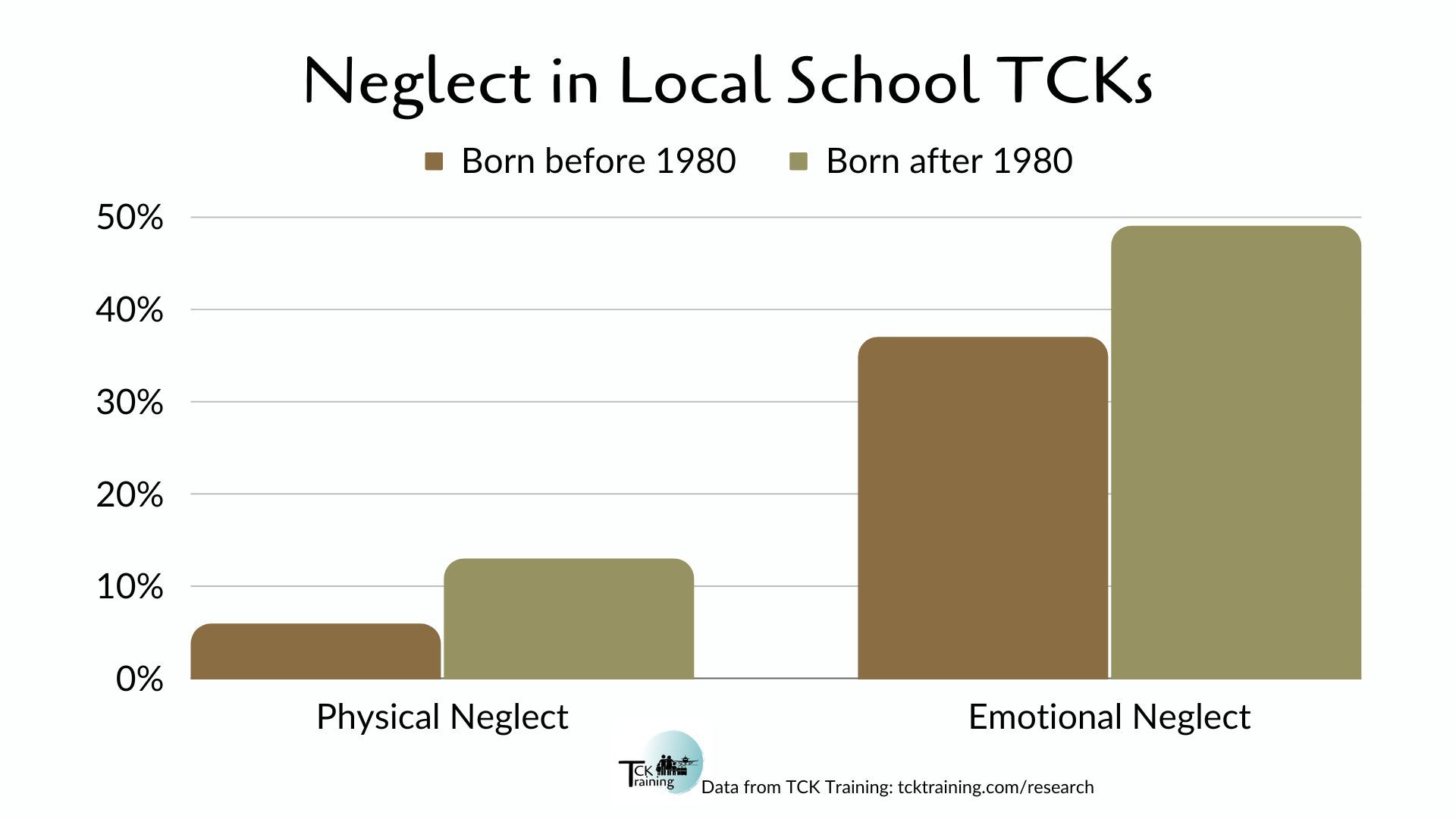
Household Dysfunction
Household dysfunction encompasses household adult mental illness, parental violence, parental divorce or separation, household adult incarceration, and household adult substance abuse. Incarceration was so low among TCKs that we have not included it in this summary.
Household dysfunction encompasses household adult mental illness, parental violence, parental divorce or separation, household adult incarceration, and household adult substance abuse. Incarceration was so low among TCKs that we have not included it in this summary.
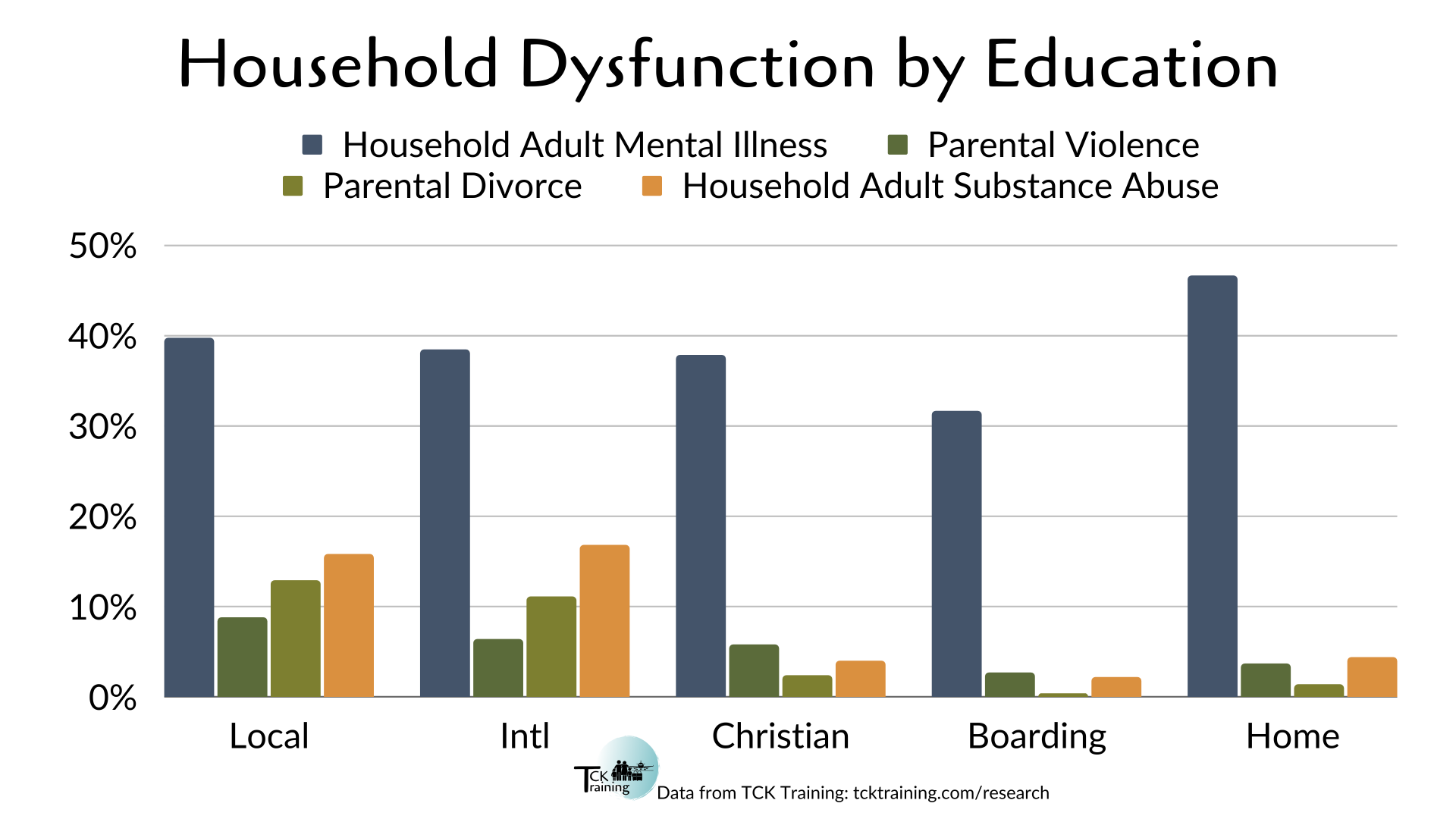
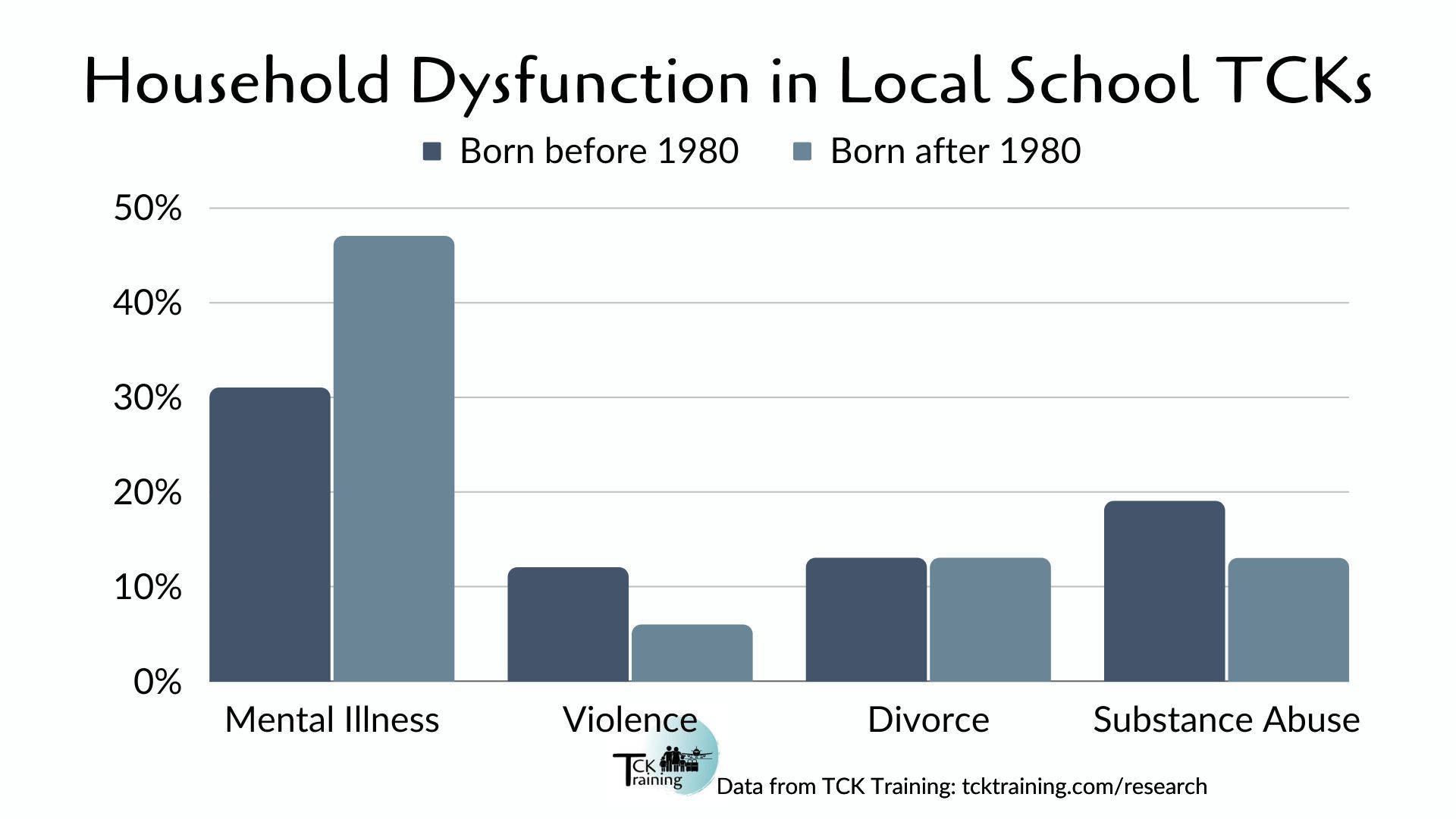
Household Adult Mental Illness
Household adult mental illness is an ACE assigned to anyone who had an adult living in their home during childhood who was depressed, mentally ill, or attempted suicide.1 in 5 of local school TCKs (40%) reported that an adult with mental illness lived in their childhood home; this is more than twice the rate reported among Americans and slightly higher than the rate reported among TCKs overall (39%). Local school TCKs reported the second highest rate of adult household mental illness across sectors, second only to homeschooled TCKs (47%).
Household adult mental illness is an ACE assigned to anyone who had an adult living in their home during childhood who was depressed, mentally ill, or attempted suicide.1 in 5 of local school TCKs (40%) reported that an adult with mental illness lived in their childhood home; this is more than twice the rate reported among Americans and slightly higher than the rate reported among TCKs overall (39%). Local school TCKs reported the second highest rate of adult household mental illness across sectors, second only to homeschooled TCKs (47%).
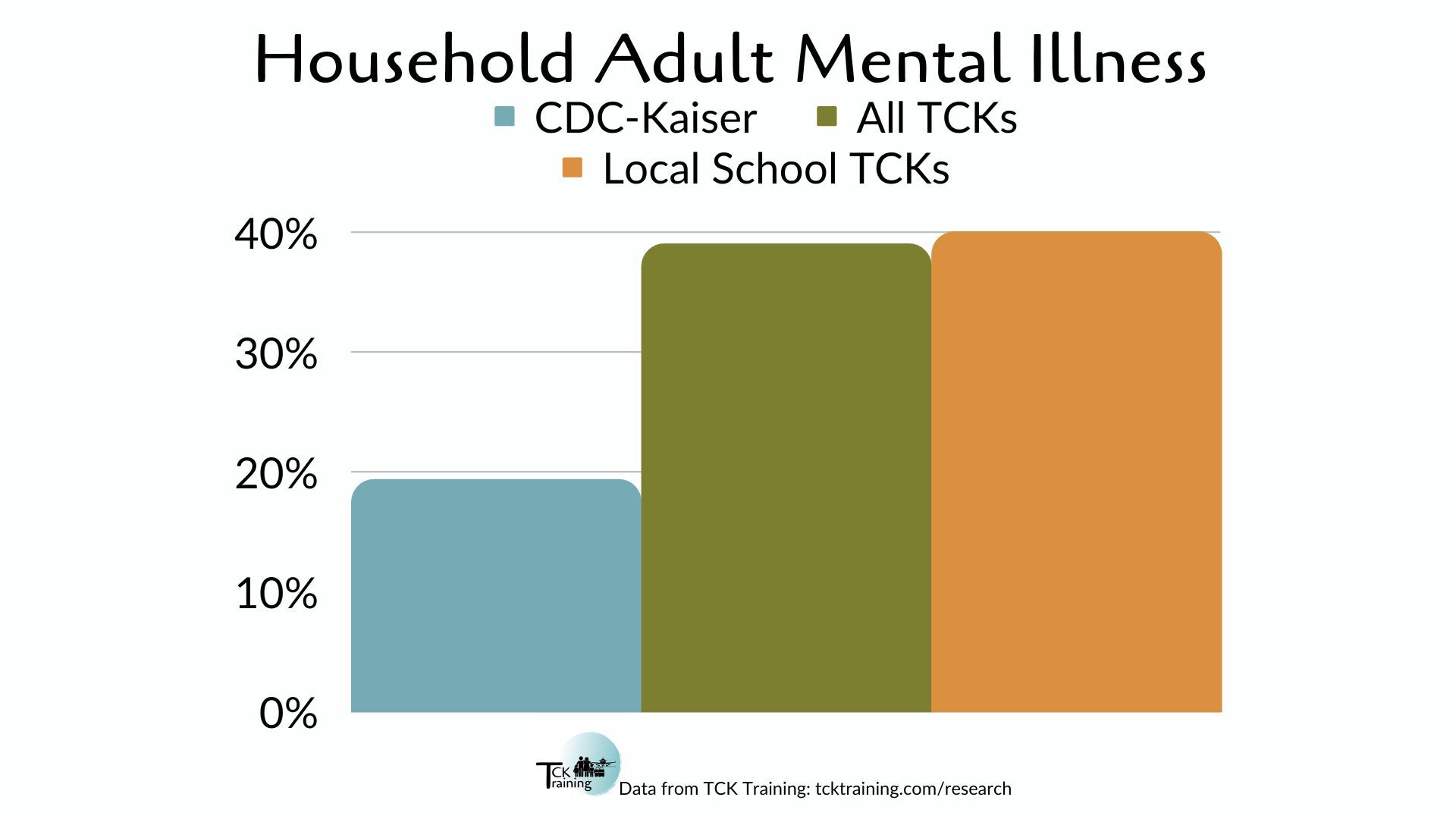
The rate of household adult mental illness reported by local school TCKs increased 1.5 times over time. 31% of Boomer/Gen X local school TCKs reported household adult mental illness, compared to 47% of Millennial/Gen Z.
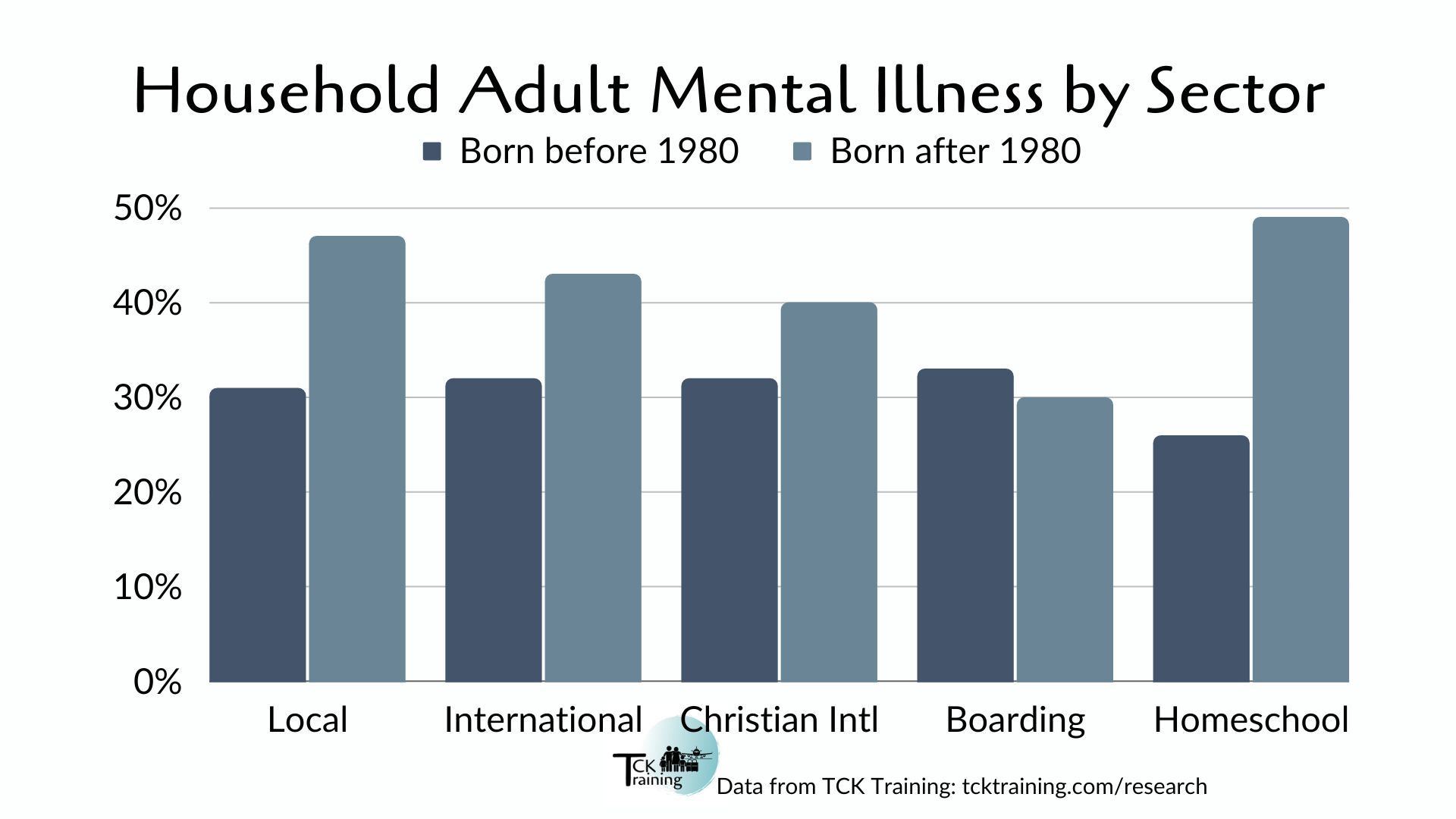
The high rates of household adult mental illness among TCKs in comparison to Americans demonstrates that many expatriate families are under stress, especially those who move abroad for work, and they need support.
Parental Violence
Parental violence is defined as a child being impacted by, even if not actually witnessing, violence toward a mother/step-mother or father/step-father. 9% of local school TCKs reported parental violence. This is a lower rate than Americans (13%), a higher rate than TCKs overall (6%).
Parental Violence
Parental violence is defined as a child being impacted by, even if not actually witnessing, violence toward a mother/step-mother or father/step-father. 9% of local school TCKs reported parental violence. This is a lower rate than Americans (13%), a higher rate than TCKs overall (6%).
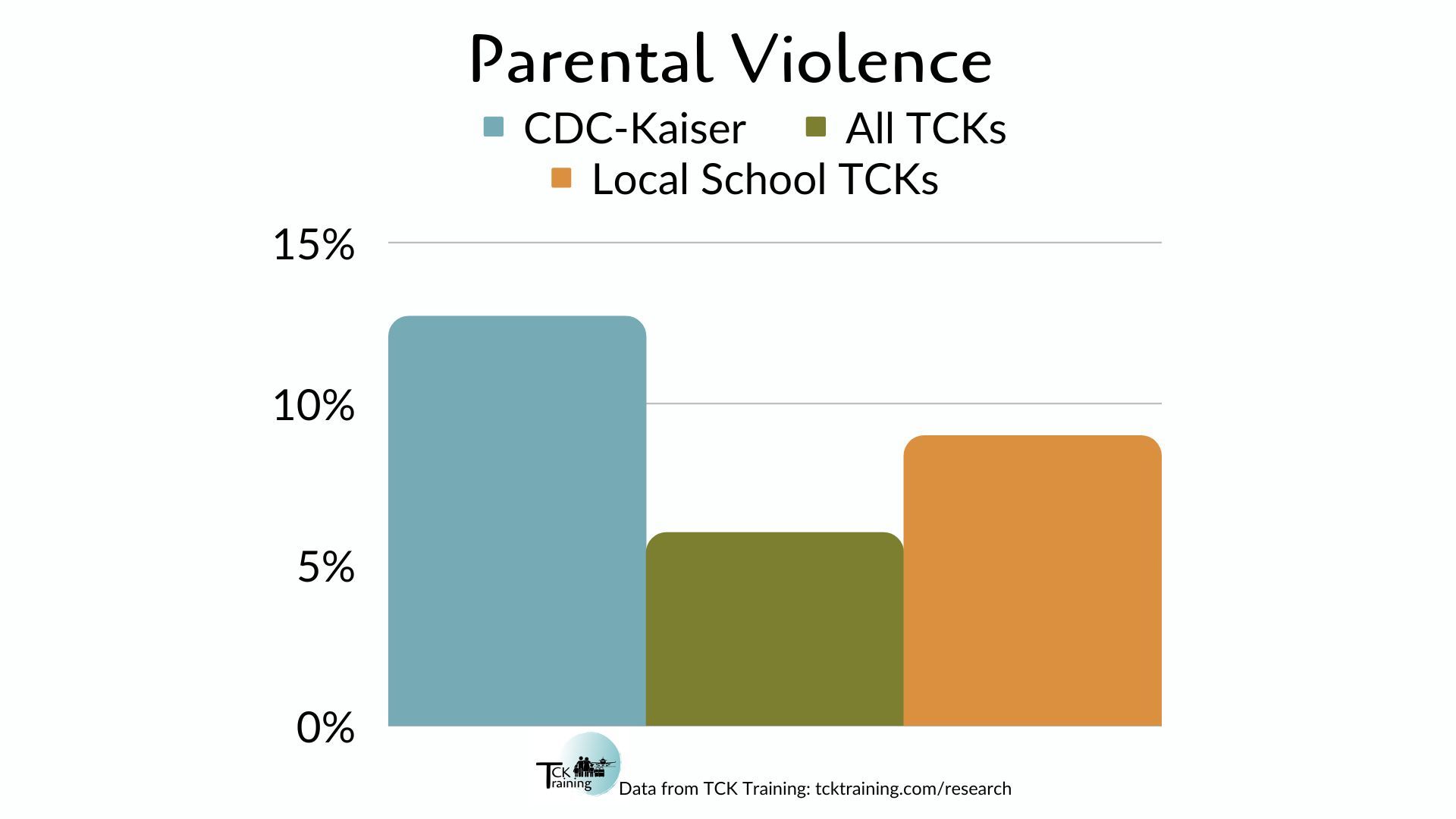
The rate of parental violence among local school students halved from 12% to 6% over time. While this decreasing trend is encouraging, local school TCKs still had the highest rate of parental violence among all education sectors, both in the older and younger generations. Unfortunately, the support needed can be challenging to find while living abroad; therefore, it is vital to extend services to these families in crisis.
It is vital that everyone who cares for TCKs be educated on what domestic abuse is, how to recognize it, and how to support families and children when domestic abuse is present.
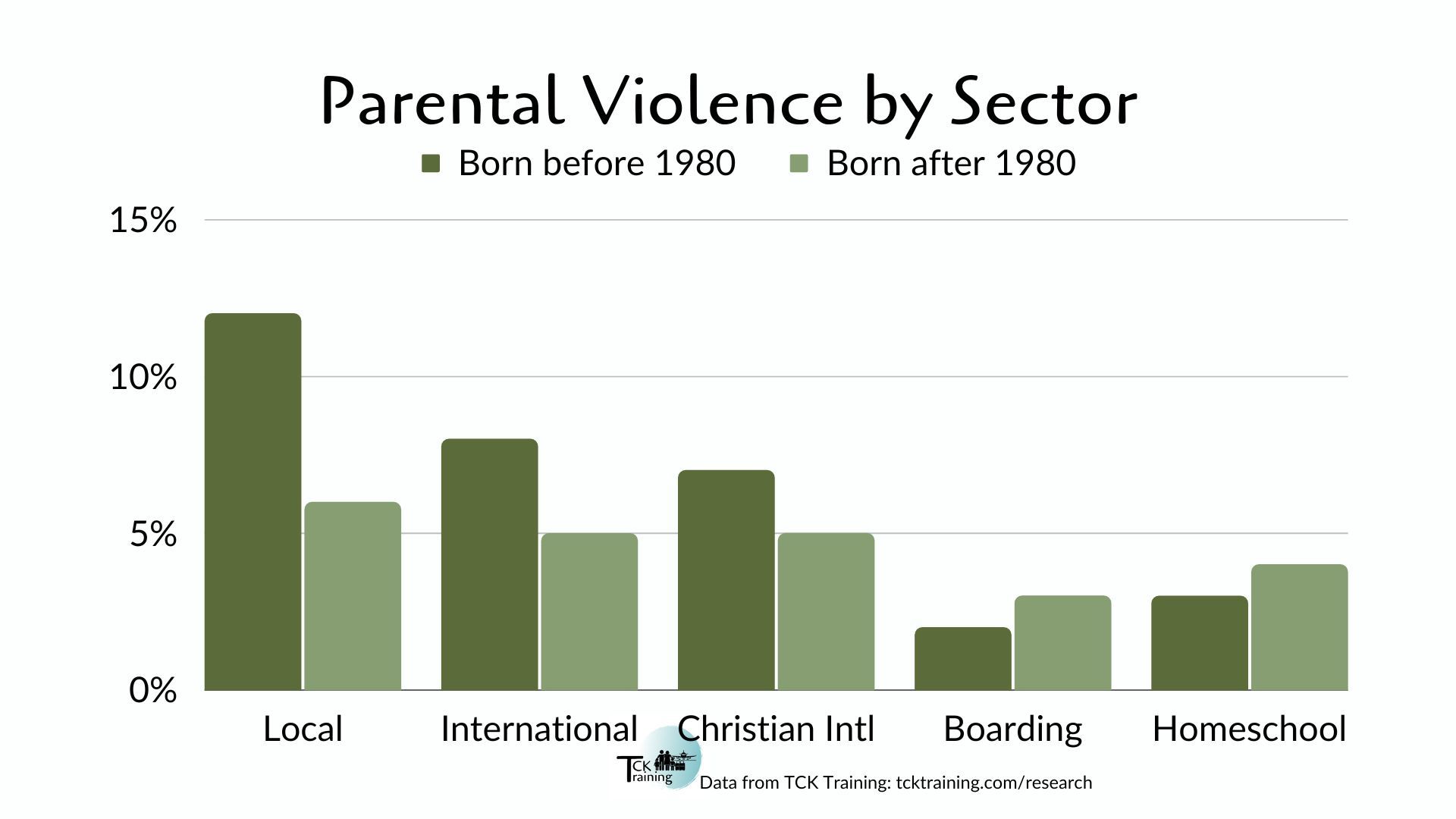
Divorce/Separation
While the rate of parental divorce/separation was 23% in the CDC-Kaiser study, it was much lower among TCKs. All sectors saw a decrease in the divorce rate over time. 13% of local school TCKs experienced parental divorce/separation before age 18, nearly twice the rate reported among TCKs overall (7%). There was no change in the divorce rate among local school families over time.
While the rate of parental divorce/separation was 23% in the CDC-Kaiser study, it was much lower among TCKs. All sectors saw a decrease in the divorce rate over time. 13% of local school TCKs experienced parental divorce/separation before age 18, nearly twice the rate reported among TCKs overall (7%). There was no change in the divorce rate among local school families over time.
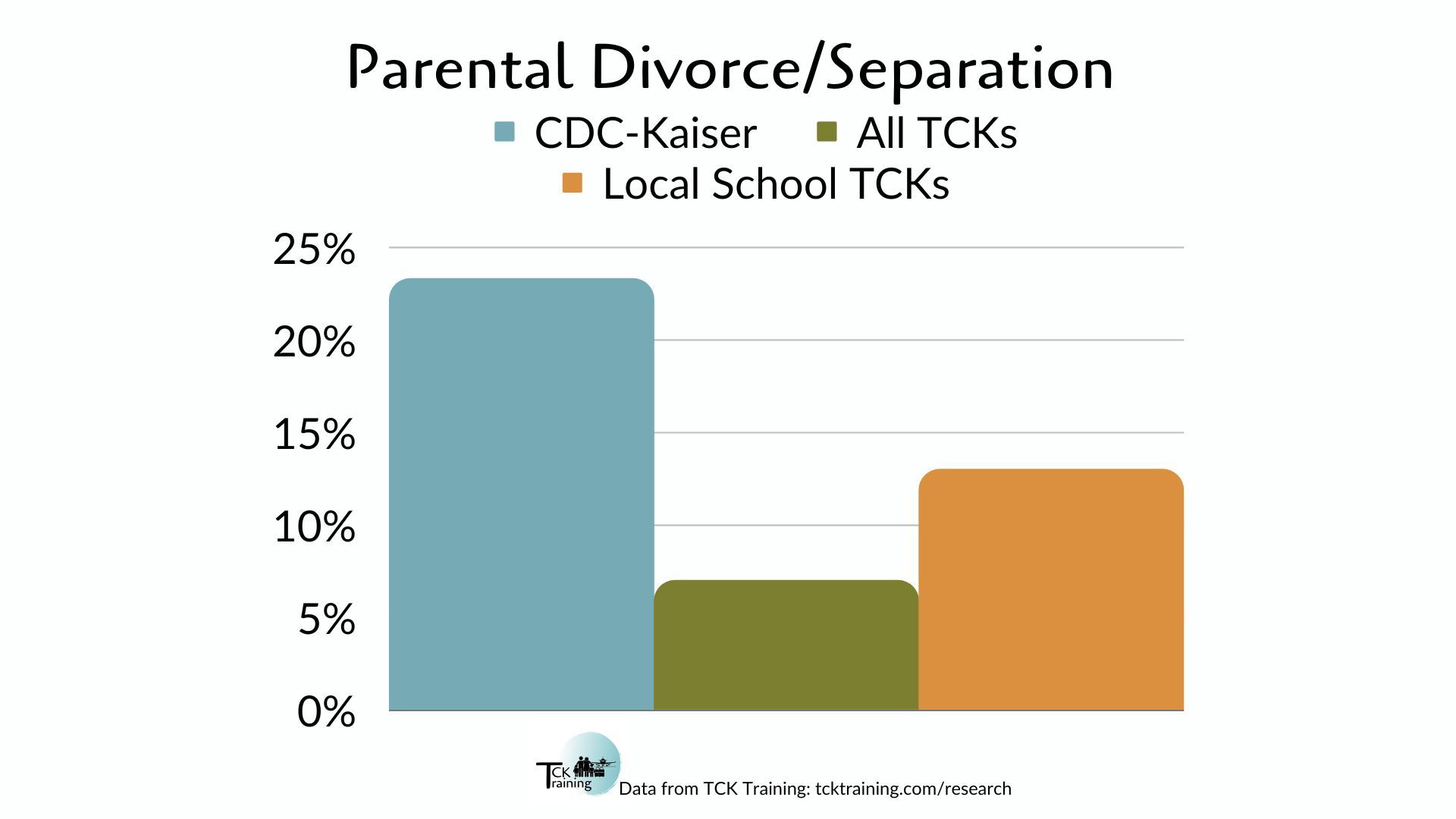
Substance Abuse
Substance abuse as an ACE factor required that an adult living in the home was an alcoholic or used illicit drugs. 16% of local school students reported household adult substance abuse, more than the 10% of TCKs overall. The rate decreased over time, from 19% to 13%. Substance abuse can be another sign of families under stress, in need of care and support.
Substance abuse as an ACE factor required that an adult living in the home was an alcoholic or used illicit drugs. 16% of local school students reported household adult substance abuse, more than the 10% of TCKs overall. The rate decreased over time, from 19% to 13%. Substance abuse can be another sign of families under stress, in need of care and support.
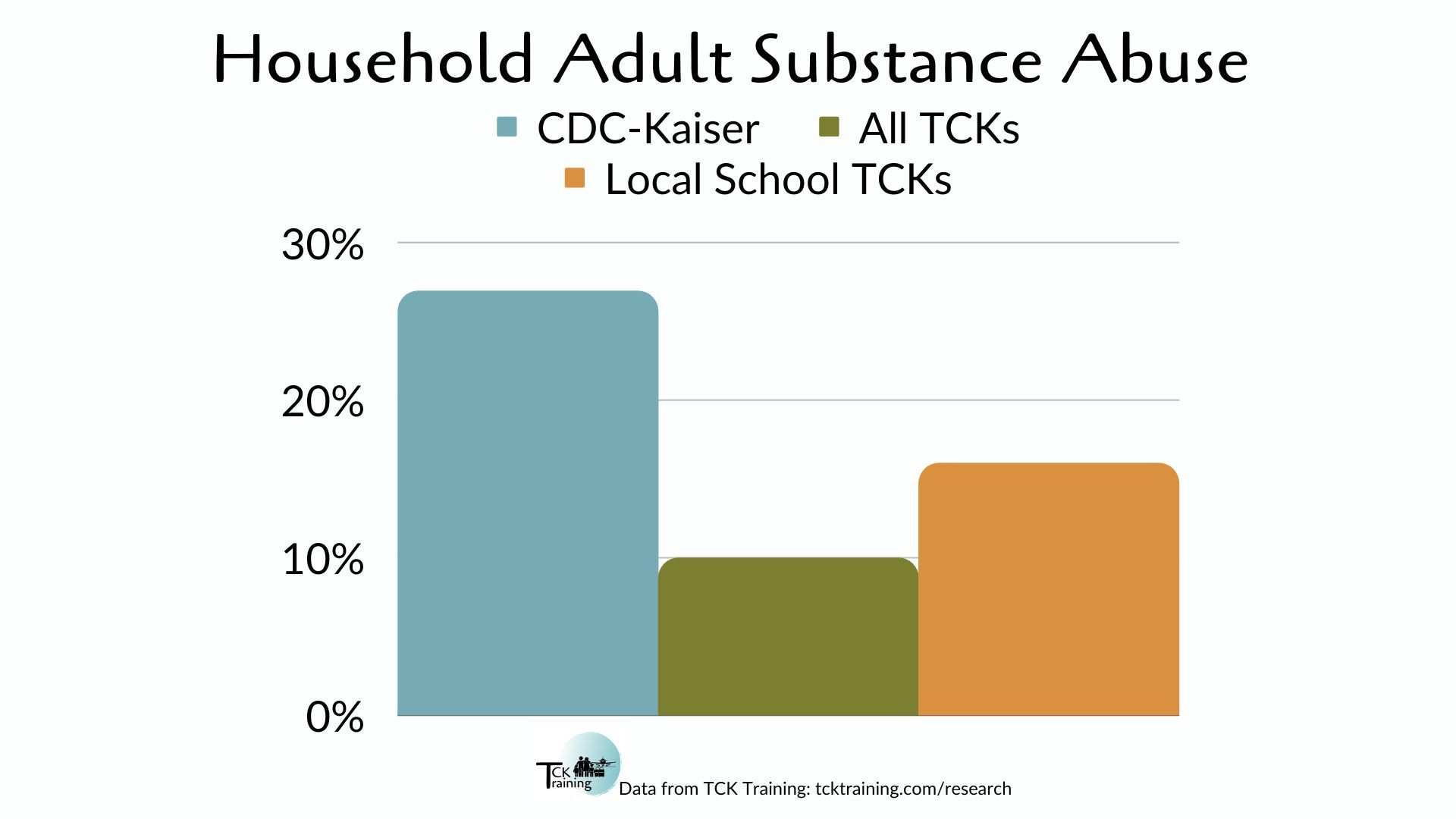
Risk Mitigation
Even though elements of this data may seem daunting, there are ways to remain hopeful and mitigate the risks we’ve discussed. Globally mobile families need support in order to raise thriving children and meet their needs. These challenges and risks are not unsolvable or reasons for despair, but rather reasons to take action in intentional ways that reflect the urgency of the matter.
In TCKs at Risk we outline a number of ways that organizations can protect children and support families. For example, additional research into Positive Childhood Experiences (PCEs) gives a roadmap for effectively buffering children from difficulties they face.
Even though elements of this data may seem daunting, there are ways to remain hopeful and mitigate the risks we’ve discussed. Globally mobile families need support in order to raise thriving children and meet their needs. These challenges and risks are not unsolvable or reasons for despair, but rather reasons to take action in intentional ways that reflect the urgency of the matter.
In TCKs at Risk we outline a number of ways that organizations can protect children and support families. For example, additional research into Positive Childhood Experiences (PCEs) gives a roadmap for effectively buffering children from difficulties they face.
Simple intentionality in parenting, policies, and procedures can mitigate the risk and increase the chances of positive, healthy outcomes for Third Culture Kids… When a person had four or more Adverse Childhood Experiences, also having at least six of these Positive Childhood Experiences lowered the risk for depression in adulthood by 72%.
With one quarter of local school TCKs (25%) reporting 4 or more ACEs, these buffering protections are particularly important. (Source: Caution and Hope for TCKs who Attend Local Schools.)
School systems vary, even within a country – some have great child protection policies in place, others have none. It is important to ensure that every child is given excellent safety education and that the adults who care for them are safe. We need to consider child protection policies specific to the education system in question, what is considered “normal” discipline, and under what circumstances a school is expected to take action and contact parents about incidents involving their child(ren). Child protection is essential, not a nice bonus. Laws differ country to country, and the onus is on parents to investigate the situation where they send their children to school.
School systems vary, even within a country – some have great child protection policies in place, others have none. It is important to ensure that every child is given excellent safety education and that the adults who care for them are safe. We need to consider child protection policies specific to the education system in question, what is considered “normal” discipline, and under what circumstances a school is expected to take action and contact parents about incidents involving their child(ren). Child protection is essential, not a nice bonus. Laws differ country to country, and the onus is on parents to investigate the situation where they send their children to school.
Globally mobility provides unique challenges for child safety. When there is a desire to report abuse, uncertainty over legal jurisdiction can stifle efforts. The passport country’s Child Protection Services might find the TCK out of their reach, with international borders standing between them.
Whether you are working to implement organizational-level strategies to care for families being sent abroad, are a parent, or a TCK Caregiver, TCK Training is here to help! We offer a range of training and support, both organization-wide and for individual families.
We have a full range of virtual and in-person servies, including Preventing TCK Neglect as an Organization, Sexual Abuse Awareness Training, and applying our research in context.
Parents seeking direct support can benefit from workshops such as Raising Healthy TCKs, Understanding Emotional Abuse and Neglect as a Parent, or Risk Prevention for Highly Mobile Families.
We have a full range of virtual and in-person servies, including Preventing TCK Neglect as an Organization, Sexual Abuse Awareness Training, and applying our research in context.
Parents seeking direct support can benefit from workshops such as Raising Healthy TCKs, Understanding Emotional Abuse and Neglect as a Parent, or Risk Prevention for Highly Mobile Families.
References:
- Caution and Hope: The Prevalence of Adverse Childhood Experiences in Globally Mobile Third Culture Kids (Crossman and Wells, 2022. TCK Training.)
- TCKs at Risk: Risk Factors and Risk Mitigation for Globally Mobile Families (Crossman, Wells and Vahey Smith, 2022. TCK Training.)
- Caution and Hope for TCKs who Attend Local Schools (Blog post, Crossman. TCK Training, 2022.)
Empty space, drag to resize
Related blog posts:
Caution and Hope for TCKs who attend Local Schools
Other blog posts in this series:
Caution and Hope for TCKs who attend Local Schools
Other blog posts in this series:
- Mitigating Risk Factors for Christian International School Students
- Mitigating Risk Factors for International School Students
- Mitigating Risk Factors for Diplomat Kids
- Mitigating Risk Factors for International Business Kids
- Mitigating Risk Factors for Military Kids
- Mitigating Risk Factors for Children of International Educators and Humanitarian Workers
- Mitigating Risk Factors for Mission Kids
- Mitigating Risk Factors for Boarding School TCKs
- Mitigating Risk Factors for Homeschooled TCKs
About the Authors
Tanya Crossman grew up in Australia and the US before moving to China at age 21; she has worked with TCKs for 20 years. She is the Director of Research and International Education at TCK Training.
Lauren is an adult TCK who grew up in East Africa and has spent nearly 10 years working with TCKs in the U.S. Her experiences have fueled her passion for supporting TCKs through preventative care that fosters healthy, thriving adults. She holds a Master’s in Public Health.



